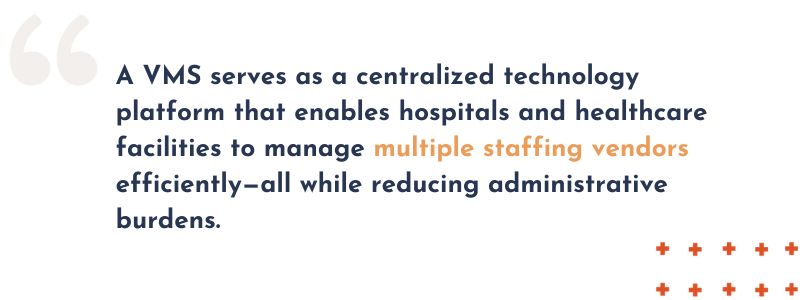News/The Importance of Vendor Management Systems (VMS) in Healthcare Workforce Management
The Importance of Vendor Management Systems (VMS) in Healthcare Workforce Management
In the ever-evolving healthcare industry, Vendor Management Systems (VMS) have become essential tools for hospitals, health systems, and medical facilities to streamline workforce management. As healthcare organizations increasingly rely on contingent staffing to meet fluctuating patient demands, a VMS provides an efficient, technology-driven solution to manage staffing vendors, track workforce performance, and control costs. By automating many aspects of the hiring and management process, VMS platforms ensure that healthcare providers can maintain operational efficiency while delivering high-quality patient care.
The Role of Vendor Management Systems (VMS) in Healthcare Staffing
Healthcare organizations face significant staffing challenges, including labor shortages, compliance requirements, and fluctuating workforce needs. A VMS serves as a centralized technology platform that enables hospitals and healthcare facilities to manage multiple staffing vendors efficiently. This system helps streamline vendor relationships, track performance, ensure credentialing compliance, and standardize billing processes—all while reducing administrative burdens.
Key Services and Benefits of a VMS in Healthcare Workforce Management
Automated Staffing and Vendor Coordination
A VMS provides an automated platform where healthcare facilities can request, track, and manage contingent staffing needs. It allows hospitals to seamlessly coordinate with multiple staffing vendors, ensuring that shifts and positions are filled quickly and efficiently.
Cost Optimization and Budget Control
One of the primary advantages of a VMS is its ability to track costs and optimize spending on contract labor. By providing real-time data on staffing expenses, contract rates, and vendor performance, healthcare organizations can control labor costs, prevent overspending, and improve budget forecasting.
Credentialing and Compliance Management
Maintaining compliance in the healthcare sector is critical. A VMS can ensure that all contingent workers meet licensing, credentialing, and certification requirements before they are assigned to a facility. This mitigates legal and regulatory risks while upholding patient safety and care standards.
Improved Workforce Visibility and Reporting
With real-time analytics and reporting capabilities, a VMS offers healthcare organizations full visibility into their workforce. Administrators can track fill rates, time-to-fill, worker performance, and vendor effectiveness, enabling data-driven decision-making to improve staffing strategies.
Enhanced Vendor Competition and Quality Assurance
By centralizing staffing needs within a VMS, hospitals and health systems can introduce vendor neutrality, allowing multiple staffing agencies to compete for placements. This fosters higher-quality talent acquisition, better pricing, and faster placement times.
Standardized Billing and Invoice Management
A VMS helps eliminate billing discrepancies by standardizing invoicing and payment processing across all staffing vendors. This ensures transparency, accuracy, and efficiency in financial transactions, reducing administrative headaches for healthcare HR and finance teams.

How Healthcare Staffing Agencies and Consultants Deploy VMS Solutions
Healthcare staffing agencies and workforce consultants implement VMS platforms on behalf of healthcare providers to streamline staffing operations. These agencies integrate VMS solutions into a healthcare facility’s existing workforce management processes, ensuring seamless adoption without disrupting patient care.
Implementation and Customization: Staffing agencies configure the VMS to align with a hospital’s unique workforce needs, including compliance protocols, reporting requirements, and billing structures.
Ongoing Management and Support: Agencies provide continuous support to optimize workforce performance, troubleshoot technical issues, and adjust staffing strategies based on real-time data.
Strategic Workforce Planning: Consultants leverage VMS data insights to improve workforce planning, reduce reliance on expensive last-minute staffing, and enhance long-term workforce stability.
Ingenovis Talent Operations (ITO): A Unique Approach to VMS in Healthcare
Ingenovis Talent Operations (ITO) takes VMS deployment to the next level by integrating contractual accountability, strategic consultation, and co-ownership strategies into its approach. Unlike traditional VMS solutions, ITO offers a high degree of flexibility, revenue-driven workforce strategies, and proprietary workforce technology that seamlessly integrates with existing hospital systems.
With a focus on efficiency, cost optimization, and non-disruptive innovation, ITO’s utilization of VMS provides healthcare organizations with a more advanced, customized, and outcome-driven staffing solution, ensuring superior workforce performance and operational success.


